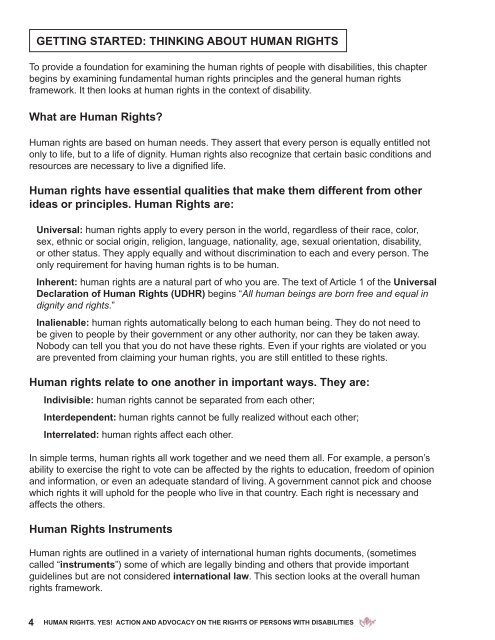- Page 2 and 3: Human Rights. YES! Action and Advoc
- Page 4 and 5: Human Rights. YES! TABLE OF CONTENT
- Page 6 and 7: FOREWORD BY THE HIGH COMMISSIONER F
- Page 8 and 9: ACKNOWLEDGEMENTS The inspiration fo
- Page 10 and 11: Human Rights. YES! Review Board Mic
- Page 12 and 13: Chapter 1 Equality and Non-discrimi
- Page 14 and 15: obJECTIvES PART I: UNDERSTANDING Th
- Page 18 and 19: ExERCISE 2: The Interdependence of
- Page 20 and 21: Two of these conventions are called
- Page 22 and 23: Although only governments have the
- Page 24 and 25: are certainly implicit in the subst
- Page 26 and 27: In 1987 the UN convened a meeting t
- Page 28 and 29: ExERCISE 4: Design a National Censu
- Page 30 and 31: experiences discrimination (e .g .,
- Page 32 and 33: Barriers to exercising human rights
- Page 34 and 35: PART 2: THE CONVENTION ON THE RIGHT
- Page 36 and 37: obJecTives The background informati
- Page 38 and 39: discrimination” therefore encompa
- Page 40 and 41: eXeRcise 1.1: what does it Mean to
- Page 42 and 43: 2. Analyze: Break into pairs or sma
- Page 44 and 45: with disabilities. It also specifie
- Page 46 and 47: AddiTionAl ResouRces on eQuAliTy An
- Page 48 and 49: obJecTives The exercises and backgr
- Page 50 and 51: eXeRcise 2.1: getting started Think
- Page 52 and 53: who is bipolar”; “You are a tee
- Page 54 and 55: eXeRcise 2.3: understanding barrier
- Page 56 and 57: In order to achieve accessibility,
- Page 58 and 59: The bbc: Taking a holistic Approach
- Page 60 and 61: chAPTeR 3: The RighT To PARTiciPATi
- Page 62 and 63: examples of barriers to Participati
- Page 64 and 65: In summary, States have the obligat
- Page 66 and 67:
People with disabilities also have
- Page 68 and 69:
4. Take Action: Use the tool you ha
- Page 70 and 71:
eXeRcise 3.4: making a commitment t
- Page 72 and 73:
• Understand the provisions relat
- Page 74 and 75:
making information Available in Pla
- Page 76 and 77:
united nations global Audit of web
- Page 78 and 79:
• Rule 4 addresses support servic
- Page 80 and 81:
eXeRcise 4.4: making a commitment t
- Page 82 and 83:
getting started: thinKing abOut the
- Page 84 and 85:
1. introduce: Explain that people w
- Page 86 and 87:
supports and out of institutions wo
- Page 88 and 89:
exerCise 5.3: advocating for Commun
- Page 90 and 91:
shelters provided to survivors were
- Page 92 and 93:
workers. (For examples of checklist
- Page 94 and 95:
Chapter 6: freedOm frOm tOrture and
- Page 96 and 97:
typical forms of Violence and abuse
- Page 98 and 99:
psycho-social disabilities is anoth
- Page 100 and 101:
3. report: Ask a spokesperson from
- Page 102 and 103:
of obtaining information and in how
- Page 104 and 105:
with disabilities (e.g., women, chi
- Page 106 and 107:
sexual ViOlenCe, explOitatiOn, and
- Page 108 and 109:
ObJeCtiVes The background informati
- Page 110 and 111:
y a number of different rights. Rel
- Page 112 and 113:
the ethics of personal assistance T
- Page 114 and 115:
what dOes human rights law say abOu
- Page 116 and 117:
• Article 23(3) addresses some of
- Page 118 and 119:
exerCise 7.4: making a Commitment t
- Page 120 and 121:
• Understand the interrelationshi
- Page 122 and 123:
health topics for discussion: • O
- Page 124 and 125:
the medical model vs. the social mo
- Page 126 and 127:
General Comment 14 proceeds to disc
- Page 128 and 129:
accessibility: a universal problem
- Page 130 and 131:
disability-based rationing of healt
- Page 132 and 133:
Persons with disabilities and hiv/A
- Page 134 and 135:
withhOlding mediCal treatment a pol
- Page 136 and 137:
sample adVanCe health Care direCtiV
- Page 138 and 139:
chAPTeR 9: The RighT To hAbiliTATio
- Page 140 and 141:
prevented from the benefit of these
- Page 142 and 143:
Peer support in habilitation and Re
- Page 144 and 145:
may include measures to provide and
- Page 146 and 147:
• • • • Invent a fictional
- Page 148 and 149:
does not like animals learn to work
- Page 150 and 151:
obJecTives The exercises and backgr
- Page 152 and 153:
The Right to work for People with d
- Page 154 and 155:
3. Report: Ask each group to presen
- Page 156 and 157:
Although much shorter, Article 27(2
- Page 158 and 159:
exeRcise 10.4: making a commitment
- Page 160 and 161:
obJecTives The background informati
- Page 162 and 163:
The Ten Principles of “independen
- Page 164 and 165:
2. discuss: Divide participants int
- Page 166 and 167:
families do not interfere with the
- Page 168 and 169:
supported decision-making for Peopl
- Page 170 and 171:
has been the victim of a crime may
- Page 172 and 173:
3. discuss: • What are the conseq
- Page 174 and 175:
International human rights law stro
- Page 176 and 177:
chAPTeR 13: The RighT To edUcATion
- Page 178 and 179:
education and access to secondary a
- Page 180 and 181:
education in Action: shudarson sube
- Page 182 and 183:
What is “inclusion”? inclusive
- Page 184 and 185:
exeRcise 13.4: speaking Up for educ
- Page 186 and 187:
exeRcise 13.5: making a commitment
- Page 188 and 189:
obJecTives The background informati
- Page 190 and 191:
exeRcise 14.1: barriers to Particip
- Page 192 and 193:
• The duty of States to take meas
- Page 194 and 195:
The inclusion in CRPD of language s
- Page 196 and 197:
disability sport in Australia: <str
- Page 198 and 199:
case law: Addressing discrimination
- Page 200 and 201:
3. Role Play/discuss: Have the spok
- Page 202 and 203:
chAPTeR 15: The hUMAn RighTs of chi
- Page 204 and 205:
arriers to children with disabiliti
- Page 206 and 207:
• challenge your own and others
- Page 208 and 209:
the CRPD affirms. The CRC provides
- Page 210 and 211:
As the example above demonstrates,
- Page 212 and 213:
• Article 13: the right to freedo
- Page 214 and 215:
eXeRcise 15.4: children with disabi
- Page 216 and 217:
exeRcise 15.5: Making a commitment
- Page 218 and 219:
obJecTives The background informati
- Page 220 and 221:
violations of human rights that hav
- Page 222 and 223:
specific or “thin brush” Approa
- Page 224 and 225:
exeRcise 16.3: how Does the CRPD Af
- Page 226 and 227:
eproductive health care, disabled w
- Page 228 and 229:
woMen wiTh disAbiliTies As oRgAniZe
- Page 230 and 231:
chAPTeR 17 The hUMAn RighTs of oThe
- Page 232 and 233:
exeRcise 17.1: what does it Mean to
- Page 234 and 235:
The cRPd, in addition to recognizin
- Page 236 and 237:
Including people with disabilities
- Page 238 and 239:
exeRcise 17.4: Making a commitment
- Page 240 and 241:
PART 3: ADVOCACY! TAKING ACTION FOR
- Page 242 and 243:
• Working to implement disability
- Page 244 and 245:
STEP 2: ARTICULATING THE CHANGE YOU
- Page 246 and 247:
Strengths: • What are your advant
- Page 248 and 249:
STEP 4: MAKING YOUR ACTION PLAN Now
- Page 250 and 251:
Balcazar, F.E. (2005) Advocacy acti
- Page 252 and 253:
Description: Measurement: 1 st Goal
- Page 254 and 255:
unIveRsAl DeclARAtIon oF HumAn RIGH
- Page 256 and 257:
Article 14. (1) Everyone has the ri
- Page 258 and 259:
(3) These rights and freedoms may i
- Page 260 and 261:
2) You have the right to leave your
- Page 262 and 263:
Article 1 Right to Equality Article
- Page 264 and 265:
(l) Recognizing the importance of i
- Page 266 and 267:
(e) Equality of opportunity; (f) Ac
- Page 268 and 269:
(a) To raise awareness throughout s
- Page 270 and 271:
(a) Enjoy the right to liberty and
- Page 272 and 273:
Article 21, Freedom of expression a
- Page 274 and 275:
language and/or Braille, and to tra
- Page 276 and 277:
appropriate steps to safeguard and
- Page 278 and 279:
(b) Facilitating and supporting cap
- Page 280 and 281:
4. A State Party which has submitte
- Page 282 and 283:
2. References to “States Parties
- Page 284 and 285:
conventIon on tHe RIGHts oF peRsons
- Page 286 and 287:
• Respect for difference • Acce
- Page 288 and 289:
2. The countries will also; a. Set
- Page 290 and 291:
nationality without a reason or bec
- Page 292 and 293:
ondary education because of their d
- Page 294 and 295:
them get out of poverty. This espec
- Page 296 and 297:
286 HumAn RIGHts. yes! ActIon AnD A
- Page 298 and 299:
288 HumAn RIGHts. yes! ActIon AnD A
- Page 300 and 301:
HumAn RIGHts InstRuments The follow
- Page 302 and 303:
instead she or he draws others into
- Page 304 and 305:
• Invite participants to let you
- Page 306 and 307:
1. HAlF-DAy/ 3 1/2 - HouR woRKsHop
- Page 308 and 309:
exercise 13.1: what Rights to educa
- Page 310 and 311:
Annex 4: A GlossARy FoR DIsAbIlIty
- Page 312 and 313:
human rights. They must adopt laws
- Page 314 and 315:
nonbinding: A document, like a decl
- Page 316 and 317:
Annex 5: InDex Abuse . . . . . . .
- Page 318:
prison ............................




